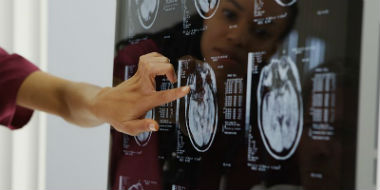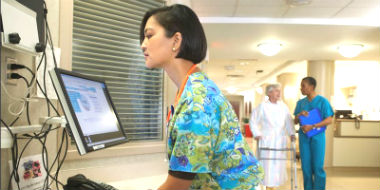Cognitive Computing
Q&A: Dr. Jane Chiang On the New Cognitive App Contest to Fight Diabetes
August 23, 2016 | Written by: Dr. Jane Chiang
Categorized: Cognitive Computing | Watson Health
Share this post:
Diabetes can be a time consuming and expensive disease — and no one understands this better than the people who live with it.
In the United States, diabetes and prediabetes cost us a staggering $322 billion each year in direct medical expenses and reduced productivity. And studies have shown that people with diabetes spend 2.3 times more on their health each year compared to people without diabetes, making it one of the most costly conditions plaguing communities and straining health systems — not just here, but around the world.
People living with diabetes are at an increased risk of many serious health complications, such as blindness, kidney failure, hypertension, amputation and heart attack. It’s because of this that the day-to-day management of diabetes is so critical. The amount of information people living with diabetes need to keep track of can become overwhelming, from monitoring food intake, exercise and blood glucose levels to managing medication and doctors’ visits. There is no cure for diabetes, but it can be managed, and technology is helping to rapidly improve the quality of life for individuals with diabetes.
In the spirit of innovation and as part of our mutual commitment to the diabetes community, the American Diabetes Association® (Association) and IBM Watson Health have launched the ChallengeDiabetes App Contest to kick-start the development of cognitive mobile apps to support people living with diabetes and prediabetes. (Deadline for submitting is Sept. 15.)
We spoke with the Association’s Senior Vice President of Medical Innovation, Dr. Jane Chiang, about the cognitive app challenge to hear how these new technology solutions could help the diabetes community — from patients to caregivers to health care providers — to improve clinical, research and lifestyle decisions for better diabetes management.
THINK: Can you give an overview of the current tools available to people with diabetes today?
Dr. Chiang: Most people today use traditional tools like the glucose meters and insulin syringes to treat diabetes. Continuous glucose meters (CGMs) and insulin pumps are higher-tech tools, with an artificial pancreas soon on the horizon.
THINK: A big part of living with diabetes is self-management. What are some of the challenges a person living with diabetes experiences every day?
Dr. Chiang: The daily and sometimes minute-by-minute issues, like counting carbs, dosing insulin and managing lows, are the toughest part. Technology can help with the tough decisions and ease the burden.
THINK: Why should a mobile app developer want to participate in this challenge?
Dr. Chiang: Developers and companies should apply because if they have a wellness app currently on the market with a good tool to support people with diabetes or prediabetes, the Association’s and IBM’s expertise and technology can amplify its capabilities and reach. The Association will provide advice from diabetes experts and access to diabetes related content, and IBM Watson Health will provide insights from cognitive analysis of the data collected by the app. We will also provide consulting on business and market models.
We want to see the innovative ways app developers can empower individuals to manage their diabetes or help their loved ones. We know there are many useful apps out there already. The goal of this challenge is to showcase the most effective ones. The Association and IBM will also offer consulting on the apps go-to-market strategy, to help accelerate visibility and process for the winning app.
THINK: Why is it important for diabetes patients, caregivers and providers to have access to cognitive tools?
Dr. Chiang: Technology tools and mobile apps need to be personalized in order to be most effective. Each individual is different. If tech tools can be customized and hyper-personalized to an individual’s exact situation, then we anticipate that the outcomes would be better.
For patients and caregivers, cognitive tools for people living with diabetes or prediabetes could be developed to provide tailored information and insights, reflecting individual factors such as demographics, disease stage, treatment regimen and behaviors.
THINK: Why is a cognitive app challenge like this important for the diabetes community?
Dr. Chiang: This is the future of health care. “Cognitive” computing refers to systems that learn at scale, reason with purpose and interact with humans naturally. Rather than being explicitly programmed, these systems learn and reason from their interactions with us and from their experiences with their environment to provide relevant, actionable insights.
Nowadays, there is so much information that it’s tough for us to process it all. Cognitive apps have the ability to bring together siloed data, or data from a variety of sources, so that providers, caregivers and even patients themselves can get the insights they need, when they need, to make better health decisions.
THINK: What do you think developers bring to the table that the medical community wouldn’t traditionally offer to people with diabetes?
Dr. Chiang: The medical community is rich with content experts and expertise — they tell you what to do. The tech community is filled with experts at the delivery — they can help with how you do something . . . like manage your diabetes.
________________________________________
NOTE: The ChallengeDiabetes App Contest is officially open! Developers are invited to apply for the opportunity to enhance their current cognitive mobile apps by leveraging the Watson APIs and the Association’s deep data repository of clinical and research data. The purpose of the contest is to advance the use of technology to promote health and to ultimately help improve the lives of those living with diabetes or prediabetes.
Developers can visit watsonhealth.ibm.com/challengediabetes to obtain an application and learn more. Deadline to submit an application is Sept. 15, 2016.

Senior Vice President of Medical Innovation, American Diabetes Association
Alleviating the Burden of Diabetes with AI
How many decisions do you make per day? From the minute you wake up in the morning until you fall asleep that same evening, you likely have to make endless choices: the route you drive to avoid traffic, what you should order for lunch, when to run errands, what type of exercise you want to […]
Watson Health: Setting the Record Straight
We at IBM have a lot to be proud of, including our pioneering work with Watson Health. Unfortunately, some media reports, including an August 11th story published by The Wall Street Journal, distort and ignore facts when suggesting IBM has not made “enough” progress on bringing the benefits of AI to healthcare. I feel it […]
Addressing Barriers in Health Equity in Cancer with Technology
Like many doctors, I became a physician to care for those who needed it most. That motivation is central to my whole career. It’s why I worked in community health centers for underserved communities in Baltimore and Washington, DC, and pushed initiatives to eliminate health disparities when I worked at the National Institutes of Health. […]


